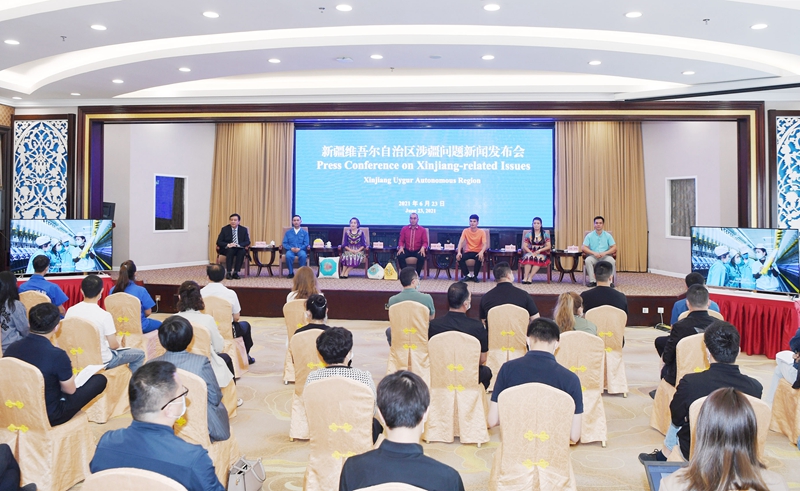
Photo taken on June 23, 2021 shows the 45th Press Conference on Xinjiang-related Issues in Urumqi, capital of northwest China’s Xinjiang Uygur Autonomous Region. Photo by Xinjiang Daily/ Zhou Peng
On June 23, 2021, a special press conference on Xinjiang-related issues was held in Xinjiang Uygur Autonomous Region. Six representatives of ethnic groups from Kashgar, Hotan, Aksu and Bayingol Mongolian Autonomous Prefecture were invited to share their work and life for us and with their real experience to refute such lies as “forced labor” and others which smear human rights situation in Xinjiang.
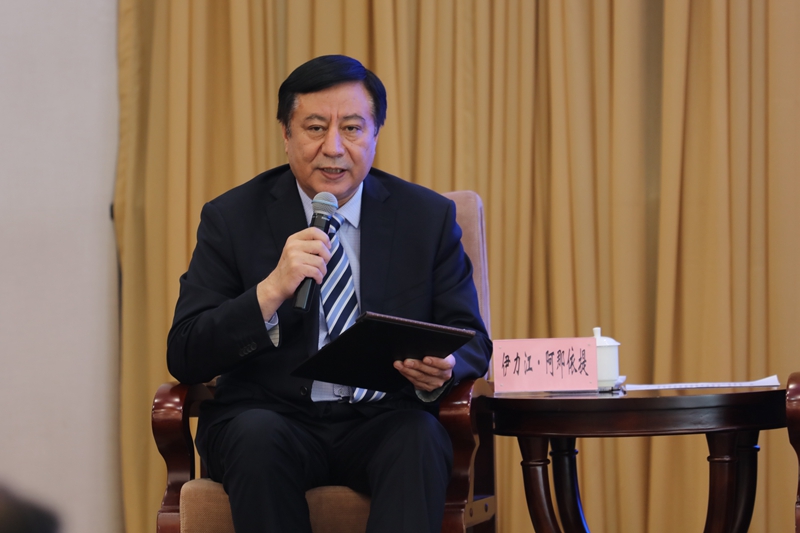
Photo taken on June 23, 2021 shows Elijan Anayat, spokesman of People’s Government of Xinjiang Uygur Autonomous Region answers questions at the 45th Press Conference on Xinjiang-related Issues in Urumqi, capital of northwest China’s Xinjiang Uygur Autonomous Region.
Elijan Anayat: Good morning, dear media friends! Welcome to the Press Conference of Xinjiang Uygur Autonomous Region on Xinjiang Related Issues. I’m Elijan Anayat, spokesman of the Government of Xinjiang Uygur Autonomous Region.
Recently, some U.S. and western anti-China forces deliberately slandered the human rights situation in Xinjiang, wantonly discredited Xinjiang’s efforts on de-radicalization and combat against terrorism. They used the lie of so-called “forced labor” to attack Xinjiang, crack down on labor industry in Xinjiang, and hinder Xinjiang’s socioeconomic development.
Workers of all ethnic groups in Xinjiang choose their occupations out of their own wishes. In accordance with the Labor Law of The People’s Republic of China and other laws and regulations and on the principle of equality and voluntariness, they sign labor contracts with relevant enterprises and obtain corresponding remuneration. They also enjoy full freedom in choosing the place of employment. The rights of workers of all ethnic groups, such as the right to remuneration, the right to rest and vacation, the right to labor safety and health protection, and the right to social insurance and welfare, are protected in accordance with the law. No matter in Xinjiang or in other provinces, their rights and interests in religious belief, ethnic culture, language are also respected and protected in accordance with law. There is no such problem as “being forced” at all.
Today, we have invited six representatives of ethnic groups to be present here. They are Maihemuti Tu’erxun, a farmer from Kumu’aoyila Village, Baishiai’rike Town, Awati County, Aksu Prefecture, Ajiguli Kadi’er, a worker from the Embroidery Factory of Yangdaman Township, Shule County, Kashgar Prefecture, Ni’ersijiang Wujiabula, an individual proprietor of Tashisayi Village Washixia Town, Ruoqiang County, Bayingol Mongolian Autonomous Prefecture, Abudumutailipu Tuohetimaimaiti, a migrant worker from Luopu County, Hotan Prefecture, Hanzhadai Ku’erban, a worker from a textile company of Shule County, Kashgar Prefecture, Keremu Abudukadi’er, a migrant worker from Pishan County, Hotan Prefecture. They will share their own experience and their present life with us.
Elijan Anayat: Over some time, the U.S. and western anti-China forces falsely accused Xinjiang of “forced labor” and launched measures to sanction Xinjiang enterprises. The fact is that their accusation is totally groundless and untenable. Xinjiang earnestly implements the 26 international labor conventions, including the 4 core conventions such as the Convention on the Elimination of Discrimination in Respect of Employment and Occupation, earnestly protects the rights of workers and opposes forced labor. Maihemuti Tu’erxun took the lead in establishing an agricultural planting cooperative, and by means of mechanization to plant cotton, he saved labor, reduced costs and increased income. Now let’s invite Maihemuti Tu’erxun, a farmer from Kumu’aoyila Village, Baishiai’rike Town, Awati County, Aksu Prefecture, to tell his story.
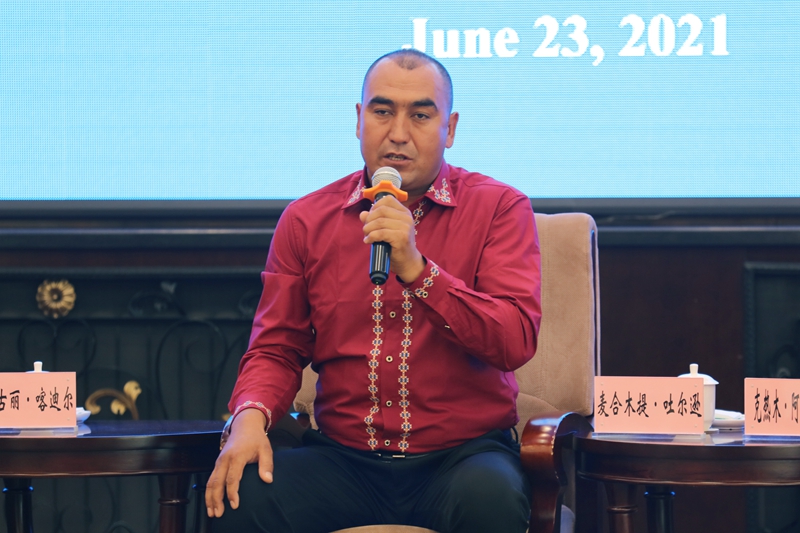
Photo taken on June 23, 2021 shows Maihemuti Tu’erxun speaks at the 45th Press Conference on Xinjiang-related Issues in Urumqi, capital of northwest China’s Xinjiang Uygur Autonomous Region.
Maihemuti Tu’erxun: Hello, everyone. I’m Maihemuti Tu’erxun, the chief of farmers’ planting cooperatives in Kumu’aoyila Village, Bashi’airike Town, Awati County of Aksu Prefecture.
I have guided the farmers in our village to increase their income and get a well off life. Last year, my annual income was 150,000 yuan. Through learning planting technology from grass-roots planting technicians, I established farmers’ professional cooperative with the villagers. We unified supply of agricultural materials, farming, sowing, and harvesting, and spread standardized and mechanized cotton planting. Now our village has been lifted out of poverty, and many people have got a well off life.
I used to plant cotton for 14 mu farmland in a traditional way. During the busy farming days, my wife and I were working in the cotton field from morning to night, which was a very hard job. Later, I found that villagers in the nearby villages were leveling the farmland and building high-standard farmland. With high level of mechanization, they got high cotton production and low labor cost. Seeing such a good profit, I could hardly wait. I took action immediately. I had a discussion with 52 households and reached an agreement. We raised funds to do land leveling, and the area of cotton field reached 303 mu. Then, the cooperative was established and was managed according to the standard management of cotton planting. Only four technical workers were needed to detect the soil moisture and seedling emergence rate. The machine was used to supply the nutrients needed by cotton on time. The efficient water-saving drip irrigation system was built, which changed the phenomenon of large-scale water flooding irrigation.
In order to improve the production efficiency, after discussing with the members of the cooperative, I signed the agricultural machinery service contract with the agricultural machinery service cooperative, using mechanized means to plant cotton. As long as we make a phone call asking for service, the large machine and equipment would go to the farmland and work on ploughing, sowing, and harvesting. During sowing period this year, the sowing of 303 mu of cotton field took only two days with a large cotton planter. Recently, we have carried out foliar fertilizer spraying operation, which was completed by UAV. It only took 5 hours to complete all the fertilization tasks. The spraying cost per mu was 4 yuan, and the cost of 303 Mu was 1212 yuan, which not only saved labor, but also realized non-contact fertilization, having greatly reduced the damage to cotton seedlings.
Last year, when the cotton was getting ripe, we all used cotton-picking machines to harvest the cotton. We sold the cotton on the same harvesting day. Excluding the cost, we earned 900 to 1000 yuan per mu.
With the whole process of cotton planting being mechanized, we have saved labor and cost. Now, the farmers in our village with breeding technology are running breeding farms and have increased their income by raising sheep and cattle. Some people go to the county to open shops to do business and some villagers go to work in their favorite enterprises out of their own interests. Now they are all “double income” farmers who earn a share of income from farming and another share of income from developing industries or working as technicians. They have a good life now.
Recently, some foreign enterprises spread a rumor saying that the ethnic groups were forced to pick cotton in Xinjiang. They are lying and cheating us. They refuse to use Xinjiang cotton just because they don’t want to see that we are living a good life. I am a farmer in Xinjiang. I want to tell those enterprises in the United States and western countries that we can plant whatever we want in Xinjiang completely out of our own wish. Most of our cotton planting in Xinjiang has adopted mechanized means, and there is no so-called “forced labor”. Please do not discredit Xinjiang wantonly!
Elijan Anayat: Thanks to Maihemuti Tu’erxun for his sharing with us his story. Recently, the U.S. and western anti-China forces have been wantonly smearing the human rights situation in Xinjiang, and have concocted the big lie that China has forced hundreds of thousands of workers of ethnic groups to pick cotton manually through compulsory labor transfer and poverty alleviation plan. The fact is that the people of all ethnic groups in Xinjiang are totally voluntary in choosing jobs and employment, and they have the full right to choose when and where they work. Ajiguli Kadi’er, who found employment near her home, has increased her family’s income and at the same time can take care of her children. She is very satisfied with her present life. Let’s invite Ajiguli Kadi’er, a worker from an embroidery workshop of Yangdaman Township, Shule County, Kashgar Prefecture, to share her story with us.

Photo taken on June 23, 2021 shows Ajiguli Kadi’er speaks at the 45th Press Conference on Xinjiang-related Issues in Urumqi, capital of northwest China’s Xinjiang Uygur Autonomous Region.
Ajiguli Kadi’er: My name is Ajiguli Kadi’er. I am 30 years old this year. I live in Yangdaman Township, Shule County.
My husband and I have three children. In order to increase our family income and live a better life, I want to find a job near my home, so that I can make money and take care of the children at the same time. My sister told me that an embroidery factory in my village wanted to recruit employees. A regular worker in that factory could get 3000 yuan a month. She advised me to apply for the job. After discussing with my husband, I decided to have a try. Unexpectedly, I passed the interview very smoothly and became an employee of this embroidery factory.
I still remember the first day when I went into the factory. When I saw the well planned and beautiful factory compound, the clean and tidy, comfortable and bright workshop and the embroidery room, I made up my mind to make my life better and better by working hard here.
Although I used to embroider some handkerchiefs and cushions at home, I knew very little about embroidery skills. The factory organized professional technicians to explain the embroidery theories to us, and taught us how to embroider. They give us demonstrations in person. I wrote down what I didn’t understand in my notebook every day, and asked the teacher for help in time. After constant practice, I slowly combined the theory our teacher had taught with my actual operation, and my operation became more and more smooth. My embroidering speed was getting increasingly fast and I could embroider more and more patterns.
Look at the big screen, please. What is shown on the screen is a embroidery “Five Stars Rising from the East”, which was embroidered by me. We also have many embroidery works, such as backpacks and pillows. What do you think of my embroidery? Is it beautiful? How about the matching of colors? Is it nice?

Photo taken on June 23, 2021 shows the embroidery “Five Stars Rising from the East”, the work of Ajiguli Kadi’er shown at the 45th Press Conference on Xinjiang-related Issues in Urumqi, capital of northwest China’s Xinjiang Uygur Autonomous Region.
Look at this portrait work. This kind of embroidery can only be completed by embroidery workers with at least ten or eight years of embroidering experience. We four embroidery workers have embroidered it for one year. When someone offered 380,000 Yuan to buy it at an auction, we were unwilling to sell it.
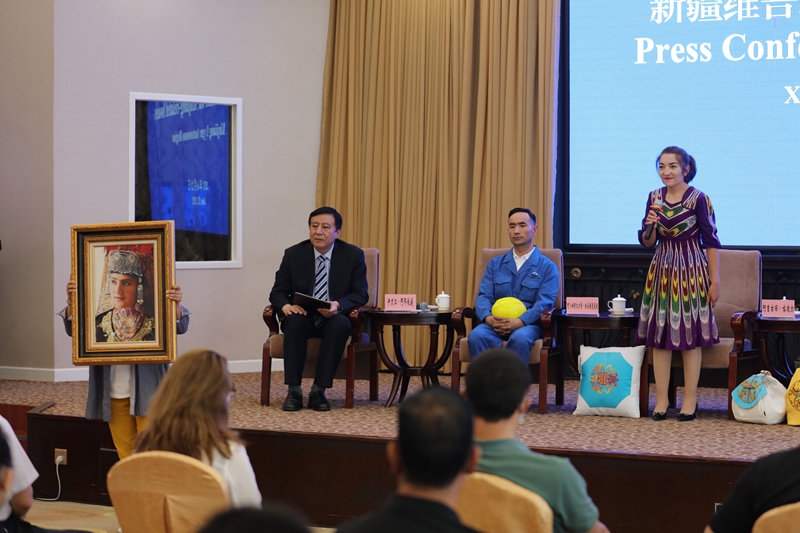
Photo taken on June 23, 2021 shows Ajiguli Kadi’er is showing their embroidery portrait work at the 45th Press Conference on Xinjiang-related Issues in Urumqi, capital of northwest China’s Xinjiang Uygur Autonomous Region.
Through my continuous effort, I became the head of our workshop in December 2020. Now my monthly income has reached 4,000 yuan. The company has also paid “five insurances and one fund” for me. The monthly income of my husband and mine has amounted to more than 8,000 yuan. Now we don’t need to worry about food, clothing and also have some savings.
Looking back on my work experience, I would not have a happy life today if it wasn’t for the former opportunity and the teachers’ conscientious teaching.
In my hometown, there are many examples like me who have grown from housewives into excellent employees in enterprises. We have realized our ideals and made our family’s life more prosperous. Whenever I see the smile on the faces of my sisters, I feel very happy.
Recently, I saw some absurd remarks made by some politicians in the United States and western countries on the internet, falsely accusing Xinjiang of the existence of “large-scale forced labor”. I feel very indignant at the funny and ridiculous remarks. It is as if an outsider is trying to disrupt my family’s good days without any justification. These people are just fabricating things out of thin air with ulterior motives. Their remarks are totally inconsistent with the facts. Our labor is completely free and there is no “forced labor”. We all go to and off work on time. We have a stable income every month and enjoy medical insurance and social insurance. We can take care of our family after work, and have free time to go shopping with friends. Such life is what I want to live.
I have grown up from an ordinary woman of a farmer’s family into a head of a modern industrial workshop, and I cherish this job very much. I will work harder in the future and create more value with my knowledge and hands. At the same time, I will take good lead and actively help my relatives and friends around me to live a happy life together.
Elijan Anayat: Thanks to Ajiguli Kadi’er for sharing your story. Some US and western media and politicians ignore the facts and falsely claimed that there is “forced labor” in Xinjiang. The truth is that China has always opposed forced labor. Relevant laws of China prohibit it. The people of all ethnic groups in Xinjiang enjoy the right to work in accordance with law and work on a voluntary basis. All their legal rights and interests are protected by law. Ni’ersijiang Wu’erbula is running his own supermarket in the village and also doing passenger transport business. His family has stable income and happy life. Let’s invite Ni’ersjiang Wujiabula, an individual proprietor of Tashisayi Village, Washixia Town, Ruoqiang County of Bayingol Mongolian Autonomous Prefecture to tell his story.
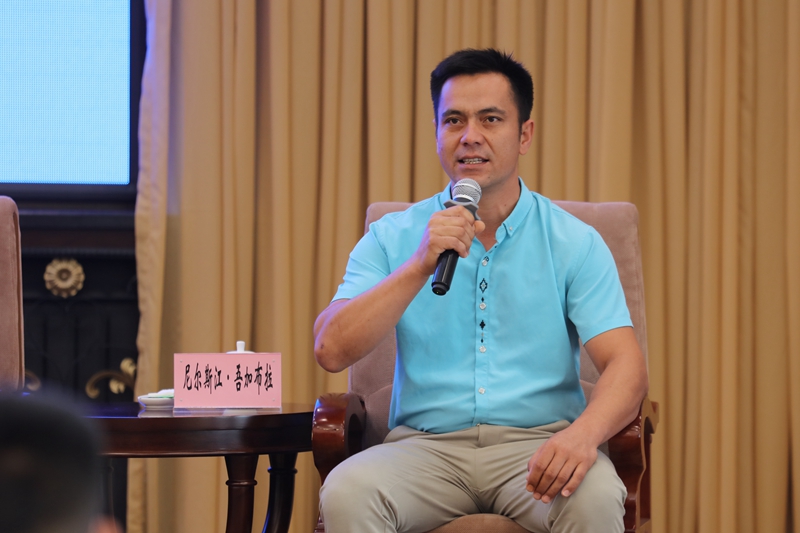
Photo taken on June 23, 2021 shows Ni’ersjiang Wujiabula speaks at the 45th Press Conference on Xinjiang-related Issues in Urumqi, capital of northwest China’s Xinjiang Uygur Autonomous Region.
Ni’ersjiang Wujiabula: Hello, everyone. My name is Ni’ersjiang Wujiabula. I am 35 years old and from Tashisayi Village, Washixia Town.
In the past, I lived in Tiemulike Township on Altun Mountain. In 2012, in response to the call of the state, I moved from Tiemulike Township to Tashisayi Village, Washixia Town. Now I have already adapted to the new life. I have not only planted red dates, done passenger transport business, but also operated an e-commerce network. These things were beyond my imagination in the past.
In 2012, I used my leisure time in winter to learn red dates planting, cattle and sheep breeding, e-commerce and driving. In 2013, I started to grow red dates and breed cattle and sheep. Owing to my herding experience of more than 10 years in Tiemulike Township, I have a unique breeding method. The sheep I have raised are growing fast, good in physique and have good immunity. People in the village come to learn from me and I teach the breeding skills to the villagers without any grudges. They have also taught me the cultivation technology of red dates in person. Under my careful management, the red dates trees in my family are growing increasingly prosperous. Under the leadership of the village administration, My breeding industry has gradually expanded its scale, the profit of breeding has gradually increased, and the income is increasing year by year. The life in my family is getting better and better.
In 2019, I saw that villagers had to go several kilometers away for express delivery, and the local characteristic agricultural products such as brassica rapa and red dates were sold in an decentralized way at a low price, so the villagers couldn’t get good profit. At this time, a bold idea flashed in my mind--to open an e-commerce network in Tashisayi Village.
With the help of E-commerce Office of Ruoqiang County, I set up a supermarket with the mode of “e-commerce + general merchandise” by using the venue in my house. Every November is the busiest time for me. In order to get a good price for the villagers’ red dates, brassica rapa and other agricultural products, I take the initiative to contact the e-commerce office to manage online publicity, promotion, sales, offline production, packaging, logistics and distribution, so as to open a broader market for the sales of local agricultural products.
Since the operation of my e-commerce network, the accumulated business income has reached more than 60,000 yuan, more than 3000 pieces of express delivery have been sent and received, and 30 tons of brassica rapa and 5 tons of red dates have been sold online and offline. E-commerce has greatly facilitated the daily life of the villagers, and at the same time, it has broadened the market of our village’s characteristic agricultural products and increased the profit from agricultural products.
On November 14, 2020, I bought a small passenger car with 7 seats. After I obtained the passenger transport operation license on the route from Tashisayi Village of Washixia Town to Ruoqiang County, I started to operate the passenger transport business, which has brought a monthly income of at least 6,000 yuan to me. My business of red dates planting, cattle and sheep breeding, e-commerce and passenger transport is expected to bring a total profit of at least 170,000 yuan to me this year.
I will continue to strive for my career and do a good job in e-commerce network and passenger transport in order to facilitate the life of my folks.
Recently, I heard that some U.S. and western anti-china forces slandered Xinjiang by saying that there was “forced labor” in Xinjiang. I was very indignant at this. Now we have a good income and our life is getting better and better, and they jumped out and said that we were “forced to work”. Why didn’t you care about Xinjiang when our living conditions were bad? Their purpose is to make us live a poor life all the time. The poorer we are, the more superior they feel. They are daydreaming. I like my work very much. This is my career and the guarantee of our family’s happy life. Our life will be better and better. Those who slander Xinjiang should face the reality.
Elijan Anayat: Thanks to Ni’ersijiang Wujiabula for sharing your story. Respecting citizens’ right to work, safeguarding workers’ legitimate rights and interests, and achieving decent work are the goals and concepts that the Chinese government has always adhered to. Xinjiang strictly abides by the principle of laws and regulations such as The Constitution of the People’s Republic of China, The Labor Law of the People’s Republic of China and The Labor Contract Law of the People’s Republic of China. On the basis of the actual situation of Xinjiang, Xinjiang has formulated and implemented a series of local policies and regulations, which provide a strong legal guarantee for citizens to enjoy the equal right of employment. With the help of the government, Abudumutailipu Tohetimaimaiti went to work in Urumqi from Luopu County, Hotan Prefecture. Abudumutailipu Tohetimaimaiti and his wife improved the quality of the whole family’s life through their hard work and prepared to settle down in Urumqi. Let’s invite Abudumutailipu Tuohetimaimaiti, an employee from Xinjiang Yuansheng Science and Technology Development Co., Ltd. to tell his story.
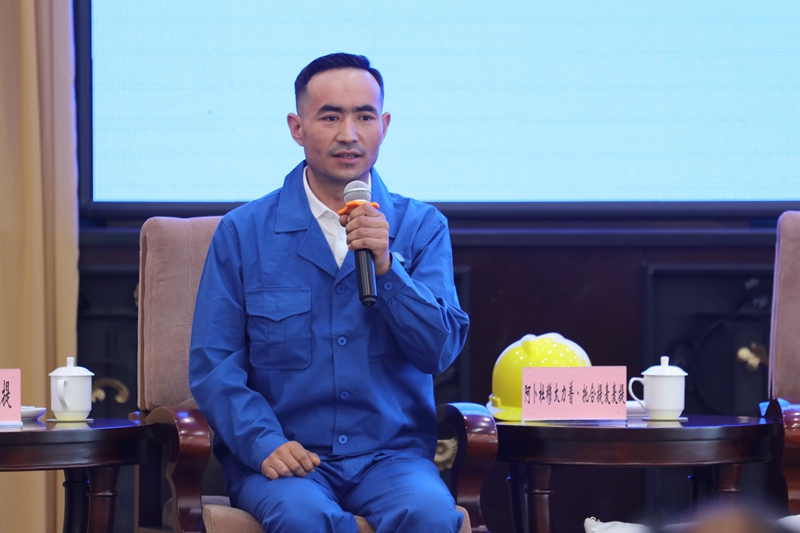
Photo taken on June 23, 2021 shows Abudumatailipu Tuohetimaimaiti speaks at the 45th Press Conference on Xinjiang-related Issues in Urumqi, capital of northwest China’s Xinjiang Uygur Autonomous Region.
Abudumutailipu Tuohetimaimaiti: My name is Abudumutailipu Tuohetimaimaiti. I come from Luopu County Hotan Prefecture. Now I work in Xinjiang Yuansheng Science and Technology Development Co., Ltd..
Before I went to Urumqi, I worked as a coolie in the construction site of Luopu County Hotan Prefecture, relying on the meager and unstable income to support the expenditure of the whole family. In the summer of 2017, the village officials told me that I could work in Urumqi with a good income and asked me if I would like to go. My mind was a little tangled at that time, and I didn’t know whether I could adapt myself there. The village officials dispelled my worries. They told me that the working environment there was very good, everyone signed a labor contract, and the salary was paid monthly. They also assured me that they would help take care of my family. I remember very clearly that on July 2, 2017, I became an employee of Xinjiang Yuansheng Science and Technology Development Co., Ltd. I worked diligently and asked for help promptly when I met with problems at work. I soon mastered all the skills of the job and took the position of group leader with a monthly salary of 4500 yuan.
In March 2018, I felt that the working conditions here were so good and the income was guaranteed, so I took my wife, Kaimai’ernisa Ayipulati, to work with me in Xinjiang Yuansheng Science and Technology Development Co., Ltd.. Now we two have a monthly salary of more than 9000 yuan, and we can send more than 2000 yuan to our family every month as living expenses. I have saved all the money except daily expenses. Through our joint efforts, now we have bought our own car, and we still have some savings of more than 100,000 yuan. We want to continue saving. When we have enough, we will buy an apartment in Urumqi, and then our parents and children can live in Urumqi. In the past I even dare not think about it.
Now, I am one of the backbone staff in our company, but I feel that there are still many businesses and skills in the company that I have not mastered, so I often take the initiative to consult colleagues working at different posts and learn lathe operation from senior masters. In my opinion, with the rapid development of the national economy and the rapid updating of knowledge, we need to acquire more latest knowledge and skills so as not to be eliminated by the times. In the future, I will study harder, master more new skills and strive for higher income.
Some new employees join our group frequently now, and they can’t handle their job at the new post. Whenever I meet these new employees, I try my best to teach them, so that they can adapt to the job as soon as possible and get familiar with the working skills. Last year, I taught five new employees and they grew into skilled workers. Their monthly income is gradually increasing.
Today, my wife, Kaimai’ernisa Ayipula, and my apprentice, Tu’erxun Tuoheti are also present here.

Photo taken on June 23, 2021 shows Maihemuti Tu’erxun(middle), his wife Kaimai’ernisa Ayipula and his apprentice Tu’erxun Tuoheti at the 45th Press Conference on Xinjiang-related Issues in Urumqi, capital of northwest China’s Xinjiang Uygur Autonomous Region.
I heard that some western anti-China forces have racked their brains to concoct the lie that there is “forced labor” in Xinjiang. I want to tell them that there is no “forced labor” in Xinjiang. We work with our own hands, learn skills with our own efforts, and earn money for our wives and children with our own ability. We don’t need to be forced by others. Please reflect on yourselves. Our life in Xinjiang is very good. We are all very happy. We can take care of our own affairs and we don’t need your concern.
Elijan Anayat: Thanks to Abudumutailipu Tuohetimaimaiti for sharing your story. People of all ethnic groups in Xinjiang have achieved decent work in the sunshine. They are willing to work and choose their own jobs, and their rights and interests are protected by law. Mai’erhaba is a head of workshop of a textile factory. Her greatest happiness is to improve the quality of her family’s life through her own work. Her greatest confidence is to use Xinjiang cotton to produce high-quality quilts, bedding and clothes. Now please watch the video “Spinning and Weaving Rainbow”.
Elijan Anayat: Over some time, some anti-China forces used the so-called “forced labor” as an excuse to attack and discredit Xinjiang. The fact is that the equal employment of people of all ethnic groups in Xinjiang is protected by law. It conforms to international labor and human rights standards, and meets the strong desire of people of all ethnic groups in Xinjiang to live a wonderful life. Through employment, Hanzhadai Ku’erban has increased her income and improved her family’s living conditions. She also hopes that more young people get a well off life through their own work like her. Let’s invite Hanzhadai Ku’erban, a worker from the Textile Company of Shule County to tell her story.
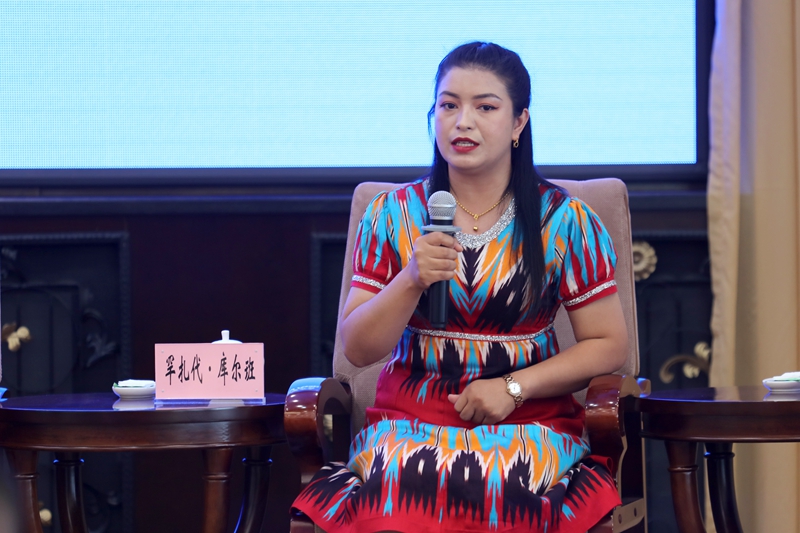
Photo taken on June 23, 2021 shows Hanzhadai Ku’erban speaks at the 45th Press Conference on Xinjiang-related Issues in Urumqi, capital of northwest China’s Xinjiang Uygur Autonomous Region.
Hanzhadai Ku'erban: My name is Hanzhadai Ku'erban. I'm 25 years old. I was born in a farmer's family in Shufu County.
In the past, I helped my parents with farming work at home, and in my spare time I did odd jobs to help with my family expenses. One day in 2017, I heard that a textile company in Shule County was recruiting workers with a minimum wage of 3000 yuan per month. I was so excited that I signed up for the job interview. Soon, I was successfully employed and signed a labor contract. The company also paid us “five insurances and one fund”, including endowment insurance, medical insurance, unemployment insurance, work-related injury insurance, maternity insurance and housing provident fund. In this way, I came to the factory with my dream of achieving a well off life and my family’s entrustment. When I first walked into the company and saw the brand-new modern equipment and clean, tidy and bright environment in the factory, I realized that this would be the starting point for me to realize my dream.
When I just started my work in the workshop, I found that the biggest challenge was the language barrier. In order to better integrate myself into the team, I must improve my standard spoken and written Chinese language level and master some professional terms. So I took the initiative to participate in business training every day, and made my own standard spoken and written Chinese language learning plan including early morning reading, watching TV programs in the evening, and being a interpreter for my colleagues. After several months of hard work, I was able to communicate with people in fluent standard spoken and written Chinese language. In order to master the technology as soon as possible, I learned repeatedly and summarized my learning constantly under the personal demonstration and patient explanation of the master. I recorded my own questions and those raised by others one by one. If I didn’t understand, I asked the teacher for help. The teacher patiently answered our questions.
Hard work pays off eventually. Through unremitting efforts, I have grown from an ordinary worker into a workshop group leader, and my salary has increased from 3000 yuan to 5100 yuan. Now, the conditions of my family are much better. The sofa and TV cabinet have been replaced with new ones. The newly-built comfortable house has also been beautifully decorated. Every time I go back home on holiday, I feel so good when lying on the sofa and watching TV after dinner. I really feel happy at the thought of the great changes in my family's life in just three years.
As an ordinary rural girl, I changed my fate by going out to work. I broadened my horizons and increased my knowledge and income. I also found my life goal and the meaning of life and hence made my life more wonderful. Days ago, I heard that some people abroad wantonly smeared Xinjiang by saying that there was “large-scale forced labor” in Xinjiang. What I want to say is that this is just a bunch of nonsense. The people of all ethnic groups in Xinjiang are totally free to work and get employment. With a stable monthly income, my family got rid of poverty in 2019. Now I am still a model for young people in my hometown to learn from. In the future, I will continue to study and work hard, actively help more aspiring young people to establish the awareness that employment can change their destiny, and lead them to live a better life.
Elijan Anayat: Thanks to Hanzhadai Ku'erban for sharing your story. In Xinjiang many more young people have learned new technologies, increased their income, and felt modern life by engaging themselves in the industries and occupations they yearn for. They have many more choices in life, and their fate has changed accordingly. Ya'ermai Amaitiyimiti chose to go to the city for employment. Through his work, he mastered new skills and got a good income, which made his life more hopeful. Now please watch the video “Aspirant Youth”.
Elijan Anayat: Xinjiang always regards the willingness and demand of workers as an important basis for formulating employment policies, broadening employment channels, developing employment posts, carrying out employment training, and providing employment services. In Xinjiang surveys are regularly conducted on workers’ employment willingness in order to timely grasp the needs of workers in terms of employment location, employment post, salary, working conditions, living environment, and development prospects. Efforts are being made to match people with posts properly and promote long-term stable employment. Keremu Abudukadi’er from Hotan Prefecture has increased his income and improved the living standard of his family by working in Horgos city. Now let’s invite Keremu Abudukadi’er, an employee of Xinlin Earthwork Company in Horgos City, Ili Kazak Autonomous Prefecture, to tell his story.
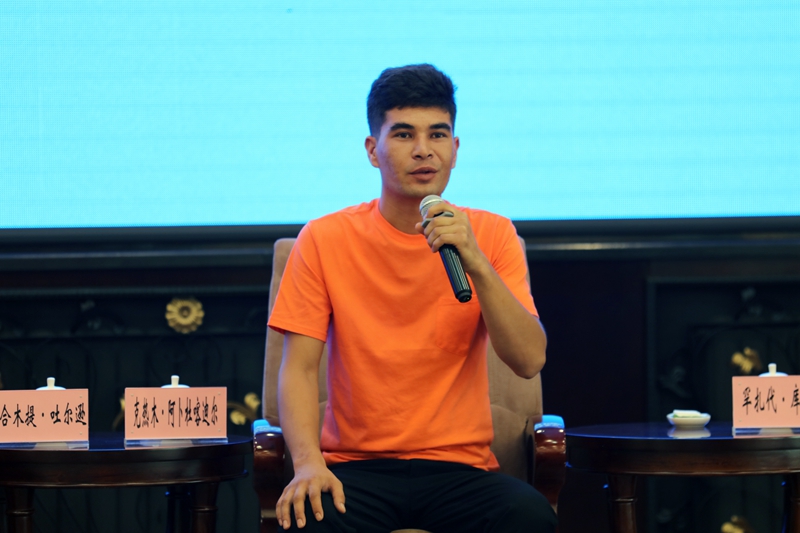
Photo taken on June 23, 2021 shows Keremu Abudukadi’er speaks at the 45th Press Conference on Xinjiang-related Issues in Urumqi, capital of northwest China’s Xinjiang Uygur Autonomous Region.
Keremu Abudukadi’er: My name is Keremu Abudukadi’er. I’m from Pishan County, Hotan Prefecture. Now I’m a worker of Xinlin Earthwork Company in Horgos city. Both My wife and I come from Pishan County.
Once village officials told me that I could sign up to work in Horgos. After investigation, I learned that Horgos is a new city with quite a number of enterprises and construction sites in need of workers. At that time, I said to my wife, Buweihailiqie, “We are still very young now. Besides, I can drive forklifts and excavators. I heard that Horgos has a good development prospect. As long as we are willing to work, we are sure to make money.” After hearing my words, my wife decided to go out to work with me. So I went to Horgos with my wife and some friends. After we got to Horgos City, I soon found a job in Xinlin Earthwork Company, and my wife also found a job in Naan Industrial Park.
At first, my salary is 4,800 yuan per month, but after unremitting efforts, I continuously improved my professional skills, and now my salary has risen to 12,000 yuan. I have become the “sweet cake” in the construction site, many bosses are scrambling for me, but I believe that wherever I work I must take it seriously in order to live a good life.
One day at the end of last year, I fell off and hurt my leg because of my carelessness at work. The company sent someone to take me to the hospital. They arranged a bed and found a doctor for me. They also arranged for someone to help me with my meals and chat with me in the hospital. They took good care of me like my family. The leaders of the company also came to see me in person, and the company covered my personal payment after medical insurance reimbursement. After leaving the hospital, the company also asked me to stay in the dormitory for recuperation and not to go to work until I was completely recovered. I felt the warmth in my heart with grateful feelings to my company. With the arrival of winter in Horgos, our company entered the downtime. I bought a car with the money I earned in the past six months and went back to Pishan County happily. My mother was very happy when she looked at my car.
Earlier this year, I went back to Horgos with my wife again. Considering that we are couple, the company specially arranged a job for my wife and allocated us an apartment for couples. Now, my wife and I have a good income. We can send some money to our parents every month. We have not only improved our own life, but also improved the living standard of our family members.
But recently, I heard that some people abroad spread the rumor that there is “forced labor” in Xinjiang. I think this is ridiculous. We work hard for our own happiness. Unexpectedly our work is described as “forced labor” by people with ulterior motives. This is a complete deception and lie. I firmly believe that “the days of working hard make me happy and through our efforts the days in the future will be sweeter than honey.”
Elijan Anayat: Thanks to Keremu Abudukadi’er for your story. Just now, through their own personal experience, the six speakers told us about their happy life and showed us their stories about how they have obtained a happy life with their own diligence and the help of Xinjiang’s high-quality socioeconomic development.
Xinjiang has always been insists on promoting employment as the biggest livelihood project. People of all ethnic groups in Xinjiang are improving the quality of their life and creating a happy and beautiful life through their work. Many more people hope to show you the real scene of their work and life. Let’s watch a group of videos
This is the end of press conference for today. Thanks to all speakers and journalists.








